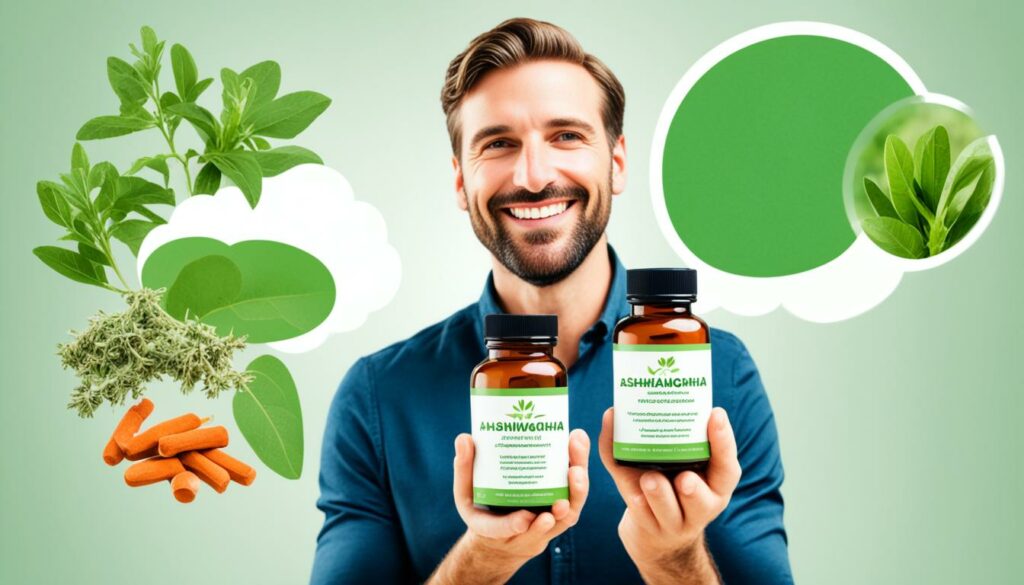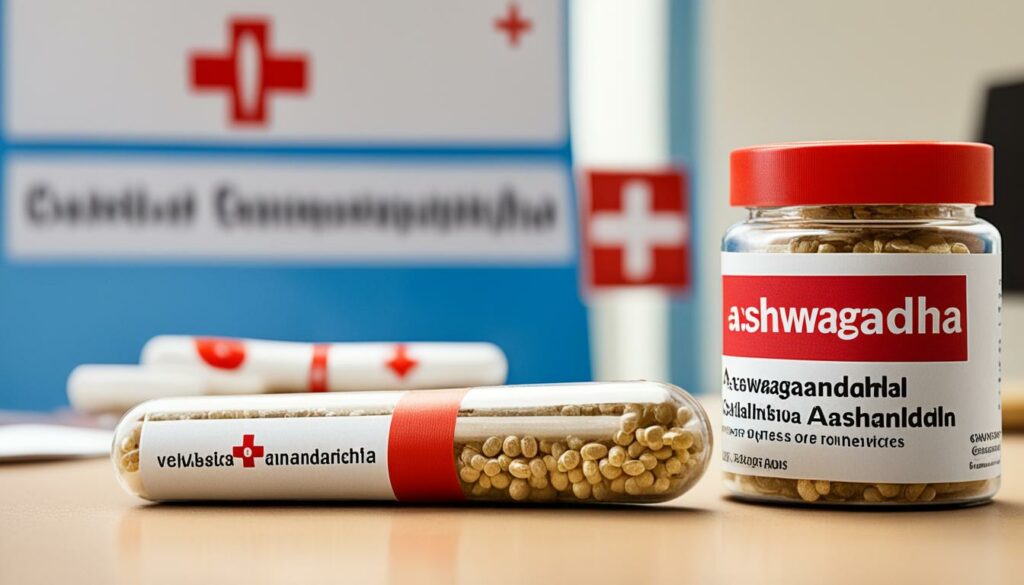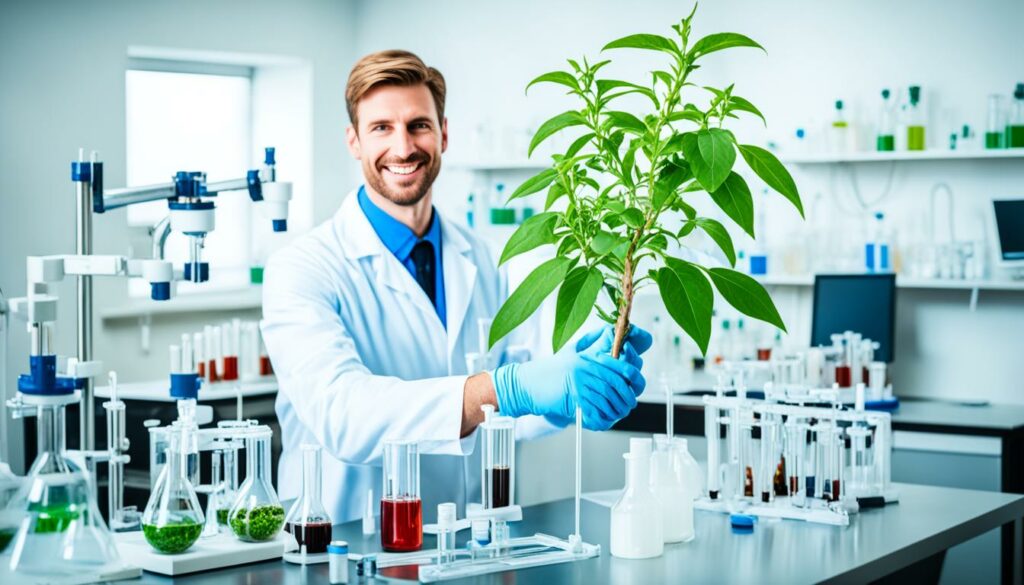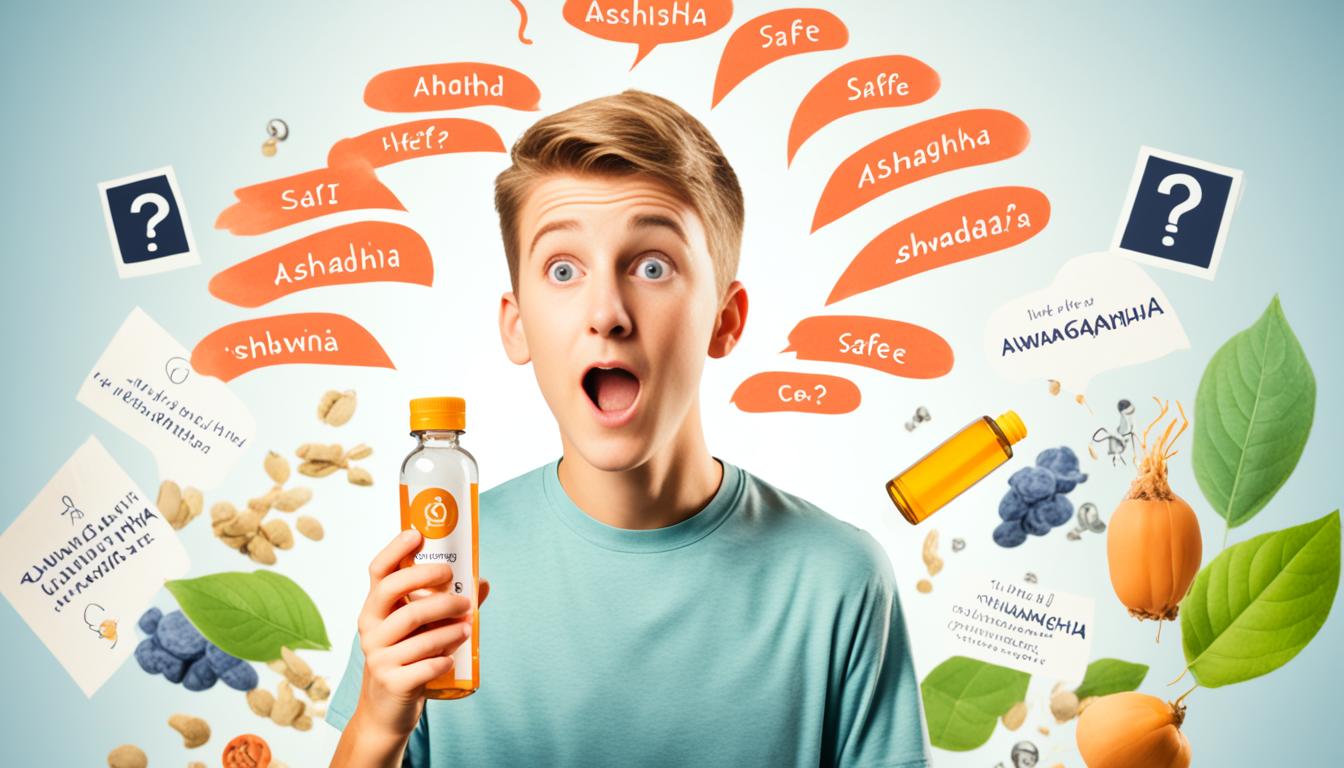Ashwagandha for Teens: Safe Use and Benefits
Ashwagandha is a popular herbal supplement known for its potential benefits in managing stress, anxiety, and promoting overall well-being. Many adults have turned to ashwagandha to support their mental and physical health, but what about teenagers? Can teens safely take ashwagandha? In this article, we will explore the safety and potential benefits of ashwagandha specifically for teenagers based on factual data from various sources.
Key Takeaways:
- Ashwagandha is a popular herbal supplement known for its potential benefits in managing stress and anxiety.
- Teenagers may be able to safely consume ashwagandha, but it’s important to consider their individual factors and consult with healthcare professionals.
- Ashwagandha may enhance brain function, boost immune function, and promote overall well-being in teenagers.
- The appropriate dosage of ashwagandha for teens may vary, and it is recommended to consult with healthcare professionals for personalized guidance.
- Ashwagandha products formulated for teenagers are available, such as gummies, but it’s important to choose reputable brands and follow recommended dosage instructions.
Effects of Ashwagandha on Teenagers

Studies have shown that ashwagandha can have several positive effects on teenagers, offering potential benefits for their overall well-being.
One prominent effect of ashwagandha on teenagers is its ability to improve brain function and cognitive performance. Research suggests that ashwagandha increases acetylcholine levels, a neurotransmitter that plays a crucial role in memory and learning processes (1). By enhancing brain function, ashwagandha may help teenagers improve their concentration and academic performance.
Ashwagandha also possesses immune-boosting properties that can support the health of teenagers. It has been found to enhance immune cell activity and reduce inflammation in the body (2). By strengthening the immune system, ashwagandha may help teenagers combat common illnesses and maintain overall well-being.
While ashwagandha has several potential benefits for teenagers, it’s essential to consider any potential risks or side effects associated with its use. Although generally considered safe for most individuals, some teenagers may experience mild gastrointestinal symptoms or allergic reactions. It’s important to start with a lower dosage and monitor for any adverse reactions. If any concerns or unusual symptoms arise, it is advisable to discontinue use and consult with a healthcare professional.
Overall, ashwagandha has shown promise in enhancing brain function, improving immune health, and supporting the overall well-being of teenagers. However, it’s crucial for parents and teenagers to consult with healthcare professionals before incorporating ashwagandha into their daily routine.
References:
- Mishra, L. C., Singh, B. B., & Dagenais, S. (2000). Scientific basis for the therapeutic use of Withania somnifera (ashwagandha): A review. Alternative medicine review, 5(4), 334-346.
- Panda, S., & Kar, A. (1997). Withania somnifera and Bauhinia purpurea in the regulation of circulating thyroid hormone concentrations in female mice. Journal of Ethnopharmacology, 57(2), 81-86.
| Effects of Ashwagandha on Teenagers | Benefits |
|---|---|
| Improves brain function and cognitive performance | Enhances concentration and academic performance |
| Boosts immune function | Supports overall health and combats illnesses |
Ashwagandha Dosage for Teens

The appropriate dosage of ashwagandha for teenagers may vary depending on various factors, including their age, weight, and overall health. It is important to consult with a healthcare professional or a naturopathic practitioner to determine the right dosage for a teenager. While ashwagandha is generally safe for adults, it’s crucial to consider the unique needs and sensitivities of teenagers before establishing the appropriate dosage.
A typical dosage for adults ranges from three to six grams of ashwagandha root powder per day. However, it is important to remember that individualized dosing is key when it comes to ashwagandha for teens.
During the consultation, the healthcare professional will consider various factors, such as the teenager’s overall health, any existing medical conditions, and any medications they may be taking. This information will help determine the most suitable dosage to ensure safety and effectiveness.
Factors Influencing Ashwagandha Dosage for Teens:
- Age
- Weight
- Overall health
- Existing medical conditions
- Medications being taken
Consulting a Healthcare Professional:
“It is crucial to consult with a healthcare professional or naturopathic practitioner to determine the appropriate ashwagandha dosage for teenagers. They will consider various factors, tailor the dosage to the individual, and provide guidance on how to integrate ashwagandha safely into their wellness routine.” – Dr. Sarah Johnson, Naturopathic Practitioner
It’s essential to follow the recommended dosage and not exceed the suggested limits. Start with a lower dosage and gradually increase it under the guidance of a healthcare professional to monitor any potential side effects or adverse reactions.
| Dosage Guidelines for Ashwagandha | Adults | Teens |
|---|---|---|
| Ashwagandha Root Powder | 3-6 grams per day | Variability; consult a healthcare professional |
| Ashwagandha Root Extract | 300-500 milligrams per day | Variability; consult a healthcare professional |
Benefits of Ashwagandha for Teen Health

Ashwagandha, a powerful herbal supplement, holds immense potential in promoting the health and well-being of teenagers. Its unique properties have been found to address various physical and emotional challenges commonly experienced during adolescence.
Stress and Anxiety Management
Teenagers often face significant stress and anxiety due to academic pressures, social challenges, and hormonal changes. Ashwagandha supplementation has shown promise in managing these symptoms and supporting emotional balance. By reducing cortisol levels, ashwagandha helps alleviate stress, promoting a calmer and more focused state of mind.
Support for a Healthy Immune System
The teenage years are a crucial time for immune system development. Ashwagandha’s powerful antioxidant and immune-enhancing properties can aid in bolstering immune function, ensuring teenagers are better equipped to fight off infections and maintain optimal health.
Improved Brain Function and Cognitive Performance
As teenagers navigate through their academic journeys, cognitive abilities play a vital role in their success. Ashwagandha has been found to enhance memory, attention span, and cognitive performance. By increasing acetylcholine levels, a neurotransmitter associated with learning and memory, ashwagandha can support teenagers in achieving their academic potential.
Enhanced Muscular Strength and Endurance
Exercise and physical activities are crucial for teenagers’ overall health and development. Ashwagandha has been shown to improve muscular strength and endurance. By reducing exercise-induced muscle damage and inflammation, ashwagandha allows teenagers to push their physical boundaries and excel in their chosen activities.
Implementing ashwagandha supplementation in a teenager’s wellness routine can potentially unlock a range of benefits, supporting their overall health and mental well-being. While ashwagandha offers great promise, it’s important to consult with a healthcare professional to determine the appropriate dosage and usage for optimal results.
| Benefits of Ashwagandha for Teen Health |
|---|
| Stress and Anxiety Management |
| Support for a Healthy Immune System |
| Improved Brain Function and Cognitive Performance |
| Enhanced Muscular Strength and Endurance |
Choosing the Right Ashwagandha Product

When it comes to selecting an ashwagandha product, you have a choice between root powder and root extract. Both options have their own advantages and it’s important to consider your preferences and therapeutic needs.
Root Powder
Ashwagandha root powder is made by drying and grinding the whole plant part. It contains a wide range of compounds that are naturally present in ashwagandha, including the beneficial withanolides. Root powder is often preferred by those who prefer a more natural and holistic approach to their supplementation.
Root Extract
Ashwagandha root extract, on the other hand, is a concentrated form of the plant. Specific compounds, such as withanolides, are extracted to ensure higher potency. Root extract is popular among individuals who prefer a more targeted and potent approach to supplementation.
Withanolide Content
Withanolides are bioactive compounds found in ashwagandha that are believed to be responsible for its therapeutic effects. When choosing a root extract product, it is essential to look for a standardized percentage of withanolide content. This ensures that you are getting a product with consistent potency and efficacy.
Considerations for Choosing
The choice between root powder and root extract ultimately depends on your personal preferences and desired therapeutic dosage. Here are a few factors to consider when making your decision:
- Your preference for a more natural or concentrated supplement
- Your specific health goals and desired effects
- Your tolerance and sensitivity to different forms of supplementation
It’s also important to note that different brands may offer various options in terms of root powder and root extract products. Be sure to research reputable brands that prioritize quality and safety.
In the end, choosing the right ashwagandha product is a personal decision. Consider your individual needs and consult with a healthcare professional to determine the best option for you.
Proper Usage of Ashwagandha for Teens

Ashwagandha is a versatile herb that can be consumed in various forms to support the health and well-being of teenagers. Understanding how and why to use Ashwagandha for kids and teenagers is essential for maximizing its benefits.
Forms of Ashwagandha:
Ashwagandha is available in different forms, including:
- Capsules: Easily swallowed and convenient for daily consumption.
- Powder: Can be added to smoothies, drinks, or used in cooking.
- Teas: Offers a soothing and calming effect when consumed as a warm beverage.
These versatile options allow teenagers to choose the form that best suits their preferences and lifestyle.
Proper Dosage and Usage:
The dosage and usage instructions for ashwagandha may vary depending on the chosen product and the specific needs of the teenager. It is crucial to follow the manufacturer’s instructions or consult with a healthcare professional for guidance on proper usage and dosing.
| Ashwagandha Form | Dosage | Usage |
|---|---|---|
| Capsules | Follow the recommended dosage indicated on the package or as advised by a healthcare professional. | Take the capsules with water or as directed by the manufacturer. |
| Powder | Typically, a dosage of 1-2 teaspoons (approximately 3-6 grams) of ashwagandha powder per day is considered safe for adults. For teenagers, it’s important to consult with a healthcare professional to determine the appropriate dosage. | Add the powder to beverages, smoothies, or use it in cooking as per personal preference. |
| Teas | Follow the instructions provided by the manufacturer for brewing the tea. | Enjoy the tea warm or let it cool down, depending on personal preference. |
It is crucial not to exceed the recommended dosage without proper guidance, and it’s advisable to start with lower doses and gradually increase if necessary.
Expert Insight: “Consulting with a healthcare professional is crucial when determining the proper usage of ashwagandha for teenagers. They can assess individual needs and provide personalized recommendations to ensure the best possible outcome.” – Dr. Sarah Thompson, Naturopathic Doctor
Following the usage instructions and appropriate dosage will help teenagers experience the potential benefits of ashwagandha without compromising their health.
Safety Considerations for Ashwagandha Use in Teens

While ashwagandha is generally considered safe for most people, including teenagers, it’s important to be aware of the potential risks and side effects associated with its use.
Some individuals may experience mild gastrointestinal symptoms, such as stomach upset or diarrhea, when taking ashwagandha. Additionally, allergic reactions, though rare, have been reported in some cases. These reactions may manifest as skin rashes, itching, or difficulty breathing.
It is crucial for teenagers and their parents or guardians to start with a lower dosage of ashwagandha and closely monitor for any adverse reactions. If any concerns or unusual symptoms arise, it is advisable to discontinue the use of ashwagandha and consult with a healthcare professional for further guidance.
It’s important to note that although ashwagandha is generally safe, individual reactions or sensitivities can vary. Therefore, it’s essential to approach its use with caution and under appropriate medical supervision.
Ashwagandha Research and Evidence

Scientific research plays a vital role in understanding the potential benefits and effects of ashwagandha on various health conditions. Numerous studies and clinical trials have been conducted to evaluate the efficacy of ashwagandha and its impact on different populations.
These research studies provide valuable evidence supporting the potential benefits of ashwagandha in managing stress, anxiety, improving cognitive function, and supporting overall well-being. The findings shed light on the effectiveness of ashwagandha as a natural supplement for teenagers.
One notable study published in the Journal of Alternative and Complementary Medicine examined the effects of ashwagandha on stress and anxiety levels. The results showed significant reductions in stress and anxiety in the study participants who consumed ashwagandha extract compared to the placebo group.
Another double-blind, placebo-controlled clinical trial published in the Journal of Dietary Supplements investigated the effects of ashwagandha on cognitive function. The study participants who took ashwagandha supplements showed improved cognitive performance and concentration compared to the control group.
These studies, along with many others, highlight the promising potential of ashwagandha in supporting and improving various aspects of teenager’s well-being. However, it is essential to consider the available research and consult with healthcare professionals before deciding to incorporate ashwagandha into a teenager’s wellness routine.
Ashwagandha Research Highlights:
- Scientific studies have shown that ashwagandha can help manage stress and anxiety levels in teenagers.
- Research indicates that ashwagandha may improve cognitive function and concentration in teenagers.
- Studies have demonstrated the potential of ashwagandha in promoting overall well-being and supporting teen health.
- It is important to consider the available research and consult with healthcare professionals to make informed decisions about ashwagandha use in teenagers.
Ashwagandha Products for Teens
When it comes to ashwagandha supplementation for teenagers, there are specific products available that have been formulated with their needs in mind. One popular option is ashwagandha gummies for kids and teens. These gummies offer a tasty and convenient way for younger individuals to consume ashwagandha, making it easier to incorporate into their daily routine.
Choosing the right ashwagandha product is crucial to ensure quality, safety, and effectiveness. It’s essential to opt for reputable brands that have undergone rigorous testing for purity and potency. Look for products that contain high-quality ashwagandha extract, preferably standardized to a specific percentage of withanolide content, which is the active compound in ashwagandha responsible for its therapeutic effects.
Following the recommended dosage and usage instructions is vital for optimal results. Be sure to read the product label and consult with a healthcare professional if you have any specific concerns or questions regarding the appropriate dosage for your teenager.
Consider the table below for a comparison of popular ashwagandha products for teenagers:
| Product | Formulation | Recommended Dosage | Withanolide Content |
|---|---|---|---|
| Ashwagandha Gummies for Teens Plus | Gummies | 2 gummies per day | 5% |
| Ashwagandha Capsules for Teens | Capsules | 1 capsule twice daily | 2.5% |
| Ashwagandha Powder for Kids and Teens | Powder | 1 teaspoon daily | N/A |
It’s important to note that individual responses to ashwagandha may vary, and the right product and dosage for your teenager may require some experimentation and consultation with healthcare professionals. Keeping an open line of communication with your teenager and their healthcare team will help ensure the best possible outcome.
In the next section, we’ll explore other integrative approaches that can be combined with ashwagandha supplementation to support teen health and well-being.
Integrative Approaches for Teen Anxiety and Stress
In addition to ashwagandha supplementation, there are other integrative approaches that can help manage anxiety and stress in teenagers. These include breathing and relaxation techniques, meditation, and yoga. These practices have been shown to have positive effects on reducing stress and promoting overall well-being.
Implementing these integrative treatments alongside ashwagandha can create a comprehensive approach to addressing teen anxiety and stress. Let’s explore each of these approaches and their benefits:
Breathing and Relaxation Techniques
Teaching teens breathing and relaxation techniques can give them valuable tools to manage their anxiety and stress. Deep breathing exercises, such as diaphragmatic breathing, help activate the body’s relaxation response and promote a sense of calmness. Encourage teens to practice deep breathing whenever they feel overwhelmed or anxious.
Quote: “Deep breaths are like little love notes to your body.” – Anonymous
Meditation
Introducing teens to meditation can have profound effects on their mental well-being. Regular meditation practice can help reduce anxiety and create a sense of inner peace. Encourage teens to start with short meditation sessions, gradually increasing the duration as they become more comfortable. There are various guided meditation apps and resources available to assist teens in their meditation journey.
Quote: “Meditation is the key to understanding the self.” – Yogesh Chabdra
Yoga
Yoga combines physical movement, breathing exercises, and mindfulness, making it a powerful practice for stress relief. Teenagers can benefit from practicing yoga regularly to improve flexibility, strength, and mental well-being. Encourage teens to explore different styles of yoga and find what resonates with them, whether it’s vinyasa flow or restorative yoga.
Quote: “Yoga is the journey of the self, through the self, to the self.” – The Bhagavad Gita
By incorporating these integrative treatments into their daily routine, teenagers can develop effective coping strategies for managing anxiety and stress. It’s important to remember that consistency is key, and it may take time for teens to fully experience the benefits. It’s also advisable to seek guidance from a healthcare professional or qualified instructor when practicing these techniques.
| Treatment | Benefits |
|---|---|
| Breathing and Relaxation Techniques |
|
| Meditation |
|
| Yoga |
|
Conclusion
In conclusion, ashwagandha can be a valuable addition to a teenager’s wellness routine, offering potential benefits such as stress management, improved cognitive function, and enhanced overall well-being. However, it is essential to approach ashwagandha use with caution and consideration.
Individual factors should be taken into account, and consulting with healthcare professionals is highly recommended before incorporating ashwagandha into a teenager’s regimen. These experts can provide personalized guidance, ensuring the appropriate usage and dosage according to the teenager’s specific needs.
By following proper usage and dosage guidelines, ashwagandha can be a safe and effective supplement to support a teenager’s health and well-being. Remember to choose reputable brands and products, and monitor for any adverse reactions. With the right approach, ashwagandha can contribute to a teenager’s journey towards optimal wellness.
FAQ
Can teenagers safely take ashwagandha?
Ashwagandha is generally considered safe for most teenagers. However, it is recommended to consult with a healthcare professional before starting any new supplement.
What are the potential effects of ashwagandha on teenagers?
Ashwagandha may have several positive effects on teenagers, including improved brain function, enhanced immune function, and reduced stress and anxiety.
What is the recommended dosage of ashwagandha for teens?
The appropriate dosage of ashwagandha for teenagers may vary. It is best to consult with a healthcare professional to determine the right dosage based on their specific needs.
What are the benefits of ashwagandha for teenage health?
Ashwagandha can help manage stress and anxiety, improve cognitive function, support immune health, and promote overall well-being in teenagers.
How do I choose the right ashwagandha product for my teenager?
When choosing an ashwagandha product, consider whether you prefer root powder or root extract. It is also important to select reputable brands and products that have been tested for quality and safety.
How should ashwagandha be used by teenagers?
Ashwagandha can be consumed in various forms, such as capsules or powders. The dosage and usage instructions may vary, so it is best to follow the manufacturer’s instructions or consult with a healthcare professional.
Are there any safety considerations for ashwagandha use in teens?
While ashwagandha is generally safe, some individuals may experience mild gastrointestinal symptoms or allergic reactions. It is important to start with a lower dosage and monitor for any adverse reactions.
Is there research supporting the use of ashwagandha in teenagers?
Several studies and clinical trials have been conducted on ashwagandha, showing its potential benefits in managing stress, anxiety, and improving cognitive function in various populations.
Are there specific ashwagandha products formulated for teenagers?
Yes, there are ashwagandha products available that are specifically formulated for kids and teenagers, often in the form of gummies for easier consumption.
What other integrative approaches can help manage teen anxiety and stress?
In addition to ashwagandha supplementation, practices such as breathing and relaxation techniques, meditation, and yoga have been shown to have positive effects on reducing stress and promoting overall well-being in teenagers.
How can ashwagandha benefit teen health?
Ashwagandha has the potential to support teenage health by managing stress, improving cognitive function, enhancing immune function, and promoting overall well-being.







